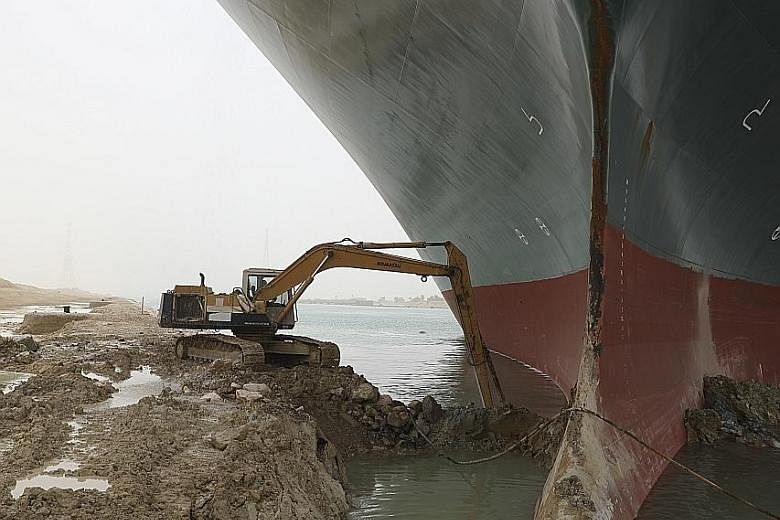ISMAILIA (Egypt) • Ships are beginning a costly and time-consuming detour around Africa with the Suez Canal still blocked by a massive container vessel, as concerns mount that a complex rescue mission could extend into weeks.
The prospect of a longer-than-anticipated disruption along what is arguably the world's most important maritime trade route threatens further turmoil in a shipping sector that is already scrambling to keep maritime transport for everything from finished goods to energy and commodities on track.
Work since Tuesday to refloat the stricken Ever Given has so far been unsuccessful, with tugs and diggers failing to budge the giant, 400m-long vessel and clear the route for stranded ocean-going carriers hauling billions of dollars' worth of oil and consumer goods.
If containers can be left aboard the Ever Given, the refloat should be completed by next Thursday, aided by higher tides, according to Mr Randy Giveans, senior vice-president of equity research for energy maritime at Jefferies.
Should cargo need to be unloaded or extensive repairs made to the canal itself, "then the downtime could certainly last at least two weeks", he said.
Two liquefied natural gas tankers loaded in the United States and bound for Asian markets appear to have changed course in the mid-Atlantic and are now heading around Africa to avoid gridlock in the Suez waterway.
A.P. Moller-Maersk and Hapag-Lloyd are considering sending ships along the same route, moves that would follow a Synergy Marine-managed ship being sent around the Cape of Good Hope.
Torm, a Danish owner of tankers, said its customers have asked about the cost of options to divert.
Vessels currently outside of the Red Sea, that were planning to use the canal, are deciding whether to reroute around Africa, adding 10 to 15 days to their voyages, said Mr Giveans.
Ships queueing on either end of the canal area are likely to wait to determine how long the passage will be closed before taking a decision to divert, he said.
A particular worry for the broader economic impact of the disruption are the supply lifelines for European companies, ranging from car manufacturers to retailers, that rely on a steady flow of Asian imports.
A rough estimate shows the blockage is costing about US$400 million (S$539 million) an hour, based on calculations from Lloyd's List that suggest westbound traffic is worth around US$5.1 billion a day, and eastbound traffic is approximately US$4.5 billion.
The disruption comes on top of pandemic impacts that have already sown havoc in supply chains with shortages and delays.
-
REROUTING AROUND SOUTH AFRICA'S CAPE OF GOOD HOPE
-
9,656km
Distance added to the journey. This works out to an extra 10 to 15 days for the ships' voyages.
$404,000
Extra fuel costs for a supertanker delivering Middle East oil to Europe.
South Korea's HMM says it has had a giant vessel waiting outside the canal to return to Asia since Wednesday. A list of the cargo aboard gives an indication of the potential for disruption across a swathe of sectors. It includes wood, machinery, frozen beef, paper, powdered milk, furniture, beer, frozen pork, auto components, chocolate and cosmetics.
Caterpillar, the largest US machinery producer, said it is facing shipment delays and is even considering airlifting products if necessary.
The US National Security Council is closely monitoring the situation, a spokesman said on Thursday night.
For the container lines that haul about 80 per cent of global merchandise trade, a prolonged bottleneck between Europe and Asia risks throwing off ship schedules that are set months in advance so that importers can plan their purchases, manage inventories and keep store shelves stocked or production lines running.
The problem compounds with every day container ships must wait. Vessels that arrive several days late cannot be emptied and reloaded in time to make the scheduled return journey. That leads carriers to cancel trips, further constraining capacity and pushing up freight rates.
Rerouting around South Africa's Cape of Good Hope would add 9,656km to the journey and about US$300,000 (S$404,000) in fuel costs for a supertanker delivering Middle East oil to Europe.
Owners of supertankers hauling two million-barrel cargoes had been losing money for weeks on the industry's benchmark trade route, a function of Opec+ withholding millions of barrels of supply from the global market.
On Wednesday, though, the carriers nudged back to profitability. Rates for smaller crude-carrying ships are climbing too, and earnings on oil-product vessels sailing from the Middle East to Europe have also jumped.
Shipbrokers report that oil traders are increasingly hiring tankers with "just-in-case" options to sail around Africa should the blockage drag on.
What is more, vessels sailing empty to collect oil in north-west Europe could be delayed, forcing the region's exporters to seek alternative carriers, according to people involved in that market.
If more ships are forced to sail around the southern tip of Africa, that will boost rates as journey times increase. Rates to charter oil tankers in some regions have climbed since the blockage first occurred. Suezmax vessels - a term used for the largest ships able to transit the Suez Canal - that typically haul one million barrels through the canal are now fetching about US$17,000 a day, the most since last June.
BLOOMBERG


